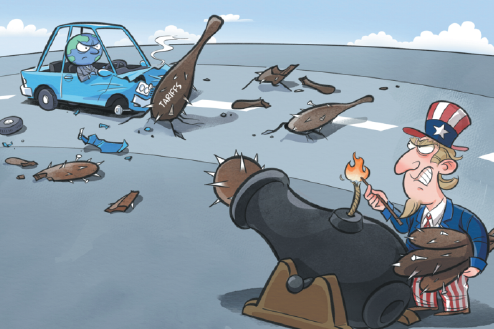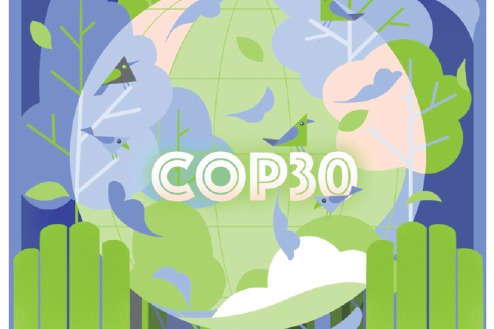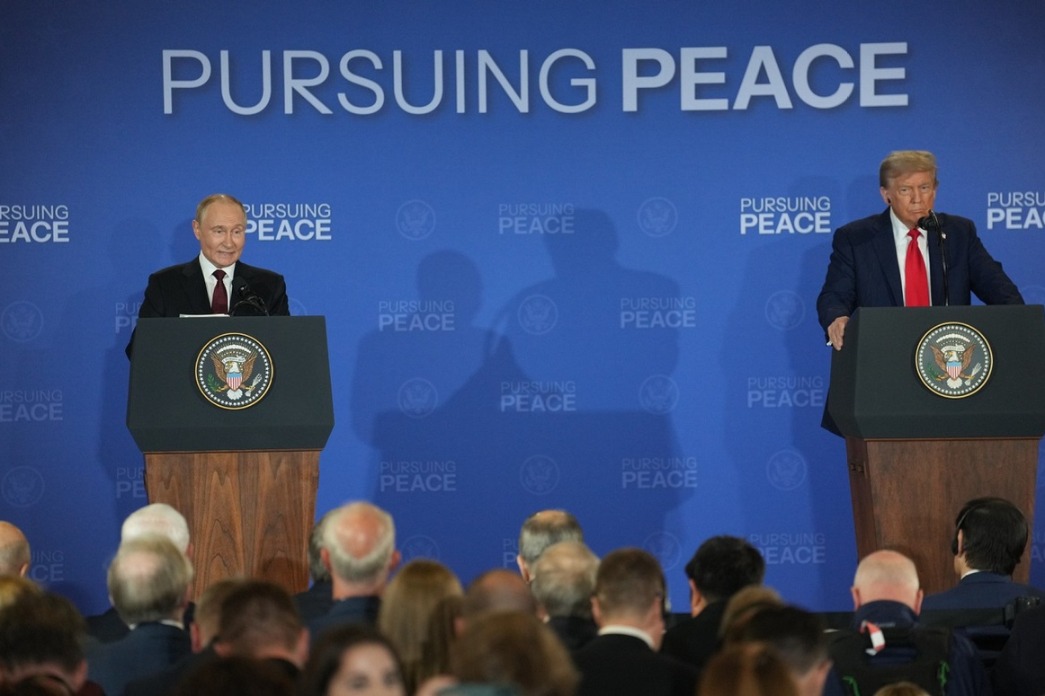Stand together
Concerted action is required to counter the coercive tariff protectionism being implemented by the United States


Prior to the 80th anniversary of the United Nations' founding which marks the birth of post-World War II institutionalized global order, an indelible blot was left by the United States government on the rules-based order its predecessors cherished.
The Aug 1 deadline set by Washington in arm-twisting the emerging economies into subscribing to the US terms and conditions on the so-called reciprocal tariffs has sent the key trading-centric economies in Southeast Asia falling in line at the command of the US.
The earlier call for an ASEAN-US summit to allow for a bilateral negotiation went unheeded, thus leaving no latitude for collective bargaining in the face of such a unilateral tariff foray. Ironically, revised tariffs with varying degree of reduction after rigorous negotiation are declared triumphs in one way or another by the respective nations, albeit the globalization-averse tariffs are all set to take toll on the competitiveness of their exports to the US market. The plain truth is that these countries have been virtually coerced into accepting the harsh deals if they want to avoid being completely denied access to the US market.
As the grave uncertainties induced by the tariff tumult have thrown the entire World Trade Organization-centric global trading system into disarray, no country across the world, with the exception of China, has truly stood up against such a naked act of protectionism. A cacophony devoid of concerted countermeasures has proven impotent to stem the tide as priorities of respective countries are understandably allowed to prevail at the expense of preserving rules-based global governance when chips are down.
Member states of the Association of Southeast Asian Nations which have long been straddling with great circumspect and astuteness in the China-US geopolitical face-off are now increasingly straitjacketed in the narrowing space of "picking no side". The juxtaposition of band-wagoning on Washington as the security guarantor, alongside embracing Beijing in pursuit of economic prosperity is getting less tenable when Washington's self-proclaimed security obligations are conditioned and leveraged to realize the economic ends of the White House in Europe and East Asia.
The evolving bilateral negotiations between Washington and several trading partners in ASEAN in recent months has further signified that proactive unilateral offer of zero-tariff market access by the latter is not being reciprocated with the same gesture. The steep US tariff rates initially announced in April this year have only been reduced to varying degrees after the bargaining countries came to terms with the US' demands for hefty coerced purchase and investments, alongside granting the US imports tariff-free market access on their individual home ground. This is evident in the case of ASEAN member states such as Vietnam, Indonesia and Malaysia. Plainly put, they have to "pay" heftily for the modest cutbacks in tariff rate. Therefore, there is no justification to celebrate the resulting compromised tariff reductions of 15 percent or 20 percent as a "triumph", as it is a Trumpian creation designed to throttle the US market access to their products.
At the same time, the tariff net cast by the Donald Trump administration spares no "transshipment" which has enabled some supply chains to circumvent the steep US tariff rates targeting China through its ASEAN neighbors. In this regard, Vietnam is a classic case of subscribing to the US' terms and demands, where transshipment of "third-country" goods, notably those of China, is subject to punitive tariffs under the new Trump tariff regime.
Parallel to this, coveted critical minerals, such as the rare earth and nickel in Malaysia and Indonesia, are now the favorite collaterals targeted by the US in the tough-going tariff negotiations with its ASEAN trading partners. The endgame is to clip the wings of expansive Chinese influence through trade and investment across Southeast Asia in its bid to salvage the US' sagging primacy.
The tariff tumult does not seem ready to end in the region, with several ASEAN member states being cowed respectively to accept the seemingly "compromised" tariff deals dictated by Washington. The scenario remains volatile as the unjustified protectionist tariff rates appear capricious. It might accord the receiving ends with a short relief amid uncertainties in trading with the US. But how these countries are going to fulfill their pledges in procuring the US products with their respective constrained financial resources in hand before the end of Trump's tenure is set to be a real test of the deals. Predictably these ASEAN member states are likely to be trapped in a "Catch-22 dilemma". On the one hand, they might have met Washington's demands for tariff-free market access and removal of non-trade barriers to strike a deal. However, on the other hand, this might alienate other trading partners who have entered into trade agreements with ASEAN, should they be denied the same terms and conditions.
In this context, the Regional Comprehensive Economic Partnership, which stands as a bulwark of regional economic integration underpinned by ASEAN Centrality, may risk bearing the brunt of the punitive tariffs against "transshipment", as in the case of Vietnam, when the integrated supply chains under the RCEP framework are being called into question. The omnipresence of Chinese contents in the various supply chains across the region looks set to be scrutinized under the US geopolitical lenses, though details of Washington's interpretation of "transshipment" are yet to be known. This adds a new dimension of uncertainty impacting the bloc.
Amid the multitude of uncertainties confronting the world, the US tariff tumult comes as a destabilizer rocking the foundation of multilateral cooperation. Arguably, the world is becoming more polarized and fragmented, leaving the United Nations behind as a dysfunctional world body that fails to reign in the US from running wild.
Having weathered through tribulations of various forms in the past eight decades, the battered UN remains a glimmer of hope in preserving the fragile peace underpinned by a rules-based global governance. The choke point lies in the conspicuous lack of cohesion and concerted efforts among the global majority in raising their concerns against the incidences of indiscipline.
The presently raging tariff tumult serves as a good lesson for not just ASEAN members, but the entire global majority, to ponder collectively the way forward in keeping the world body sustainable amid the prevailing global flux.
The author is president of the Belt and Road Initiative Caucus for Asia Pacific. The author contributed this article to China Watch, a think tank powered by China Daily.
The views do not necessarily reflect those of China Daily.
Contact the editor at editor@chinawatch.cn.


































